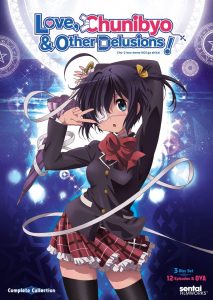
(Neo, Uncooked Media)
Love, Chunibyo & Other Delusions is an excellent teen comedy-drama – a label that fits a show that’s broad comedy for the first half and urgent drama for the second. It’s by the studio (Kyoto Animation) and director (Tetsuya Ishihara) which brought you Clannad and Haruhi Suzumiya. That will encourage some readers and scare others, but Chunibyo is worth seeing even if you’ve sworn off such fare. The characters, comedy and story are great, and the subject is universal.
The show’s about people, mostly youngsters, who live in fantasies of their own invention. “Chunibyo” is a colloquial Japanese word, meaning roughly ‘middle-school syndrome.’ It denotes the behaviour of kids who act like heroes of their own imagined movies, slipping into fantasy identities to madden those around them. One example is Okabe in Steins;Gate who presents himself as a scene-chewing mad scientist, though he’s too old to technically qualify as chunibyo. But the label spills into the wider issue of geek lifestyles, of people who immerse themselves in fantasy.
A couple of years ago, Scotland Loves Anime screened the enjoyable film Aura, about a schoolgirl convinced that she’s magical. Love, Chunibyo & Other Delusions also has a girl dreamer, the always-eyepatched Rikka, who babbles about a fantasy world with invisible boundaries and wicked eyes. Rikka herself is seen through the eyes of a perplexed schoolboy, Yuta.
Yuta has a ghastly secret. Until very recently, he was a chunibyo fantasist himself, pretending to be a mighty warlock. Now, though, he looks on that time with cringing embarrassment. He’s determined to start his new school as a normal, popular student, not weird at all, and is aghast when Rikka attaches herself to him, declaring him her magic ally. Worse, Rikka is living in the apartment over his…
Let’s be clear; this is a real-world story, though there’s a knowing moment early on when Rikka removes her eye-patch and Yuta is tempted by the thought that she might be magic. But one of the show’s best jokes is to animate its characters’ silly fights as fantasies, full of huge magic weapons, leaps over rooftops and explosions. They’re great fun, with our knowledge that these fights are imagined making them seem more spontaneous and enjoyable than most anime fights-of-the-week. When we cut to the “real” fights, often with Rikka wielding a brolly and looking daft, the bathos recalls the Ant Man trailer where a shrunken supervillain knocked a toy train over.
The first half is full of funny farce and physical knockabout (and equal opportunities knockabout, so that a boy bopping a girl on her head is quite acceptable). Characters roll round manically on the floor like spinning tops. Later we meet another chunyobi girl, Rikka’s groupie Dekomori; this newcomer wields her twin-tail hair as a weapon, even though it often topples its owner. But the best comedy comes from Yuta’s sheer toe-curling, “Was I like that?” embarrassment. After all, his secret chunibyopast leaves him wide open to blackmail…
The show’s more serious second half will divide viewers. We learn more about why Rikka went chunibyo, and about how her fantasies reflect her life. It’s familiar teen-drama fare, but still done very well, partly by reining back on anime’s excesses. Rikka’s situation is plausible; there are no crazy illnesses or accidents. Yes, the story falls into the “boy must help girl with a problem” format, but Yuta faces a moral dilemma; how to help someone who seems in profound denial of the world?
The situation is made more compelling still by Rikka’s stern adult sister, who influences events for believable reasons. But mostly the show is carried by sheer charm. Some of the funniest moments are in serious episodes, the laughs based again round embarrassment. The last episode (excluding part 13, an OVA) slides into full-on melodrama, with shouting and grand gestures, plus a twist reveal to make some fans’ eyes roll… and yet the twist is touching and right.
The visuals are polished, generally unexceptional, but with flourishes of more vivid movements and expressions here and there. (The sixth episode has more of these flourishes than most, though it’s not especially important to the story.) The cute level is high but not excessive; yes, there’s a swimsuit episode, but the girls are motivated by deeper things than boys or cake. Conversely, the male Yuta is far more proactive than most anime schoolboys, trying to decide what growing up means.
The English dub is excellent, especially Brittney Karbowski as Rikka’s worshipper Dekomori, who carries much of the emotional weight later in the series. The dub changes a gag about Rikka’s shaky English to her shaky French for obvious reasons, though some dialogue about Japanese speech forms translates less well.
The end is very satisfying, though a bit diminished by a mediocre OVA ‘extra’ episode. While a second series has been made in Japan (subtitled “Heart Throb”), it’s hard to see how it can avoid diminishing returns, which reflects well on the original series.
